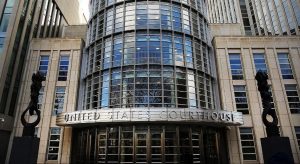
The Truth in Lending Act (TILA) generally prohibits arbitration clauses in home loan transactions. Last year, a class action was filed in state court and later removed to federal court. (Lyons v. PNC Bank, N.A. (D. Md., Jan. 6, 2021) 2021 WL 50918.) The plaintiff alleged that he obtained a Home Equity Line of Credit (HELOC) from PNC Bank’s predecessor-in-interest in 2005. The plaintiff signed a HELOC agreement that did not contain an arbitration clause.
Separately, the plaintiff opened two deposit accounts with the bank, one in 2010 and one in 2016, and for each account, agreed in writing to be bound by the bank’s account agreement and any amendments. The account agreement included a set-off provision and gave the bank a security interest in deposit accounts, and also was amended to add an arbitration clause. The bank later used the set-off provision to make a HELOC payment from each deposit account.
The plaintiff sued the bank, alleging that the withdrawals were unauthorized under TILA. The bank moved to compel arbitration based on the arbitration clause in the account agreement. The issue was the scope of the statutory language that prohibits arbitration clauses in home loan transactions. The bank argued that the prohibition did not apply because the arbitration clause was in the separate account agreement, not the HELOC agreement. The bank also argued that the arbitration clause should control because the plaintiff’s claims arose out of the bank’s set-off payments and the account agreement authorizing them.
The District Court denied arbitration as to the second set-off claim, finding that “[t]o conclude that the Account Agreement’s arbitration clause is not part of the HELOC credit transaction would be to improperly ignore [the bank’s] own intertwining of the Agreement with the HELOC.” (Lyons at *4.) (The Court granted arbitration as to the first set-off, but only on the procedural ground that that account and its related arbitration clause predated the effective date of the TILA restriction.)
The bank appealed to the Fourth Circuit Court of Appeals, and on May 24, 2021, the Consumer Financial Protection Bureau (CFPB) filed an amicus curiae (“friend of the court”) brief, urging the Court to affirm the ruling denying arbitration, because to allow it “would create a broad loophole that would harm consumers” by allowing lenders to evade the TILA restriction by placing arbitration clauses into “related but ostensibly separate agreements.”
The CFPB argued that the TILA restriction by its terms applies not only to home-loan agreements themselves but also to any other contract between the borrower and lender “relating to” the loan, and that “[b]ecause the agreement governing those accounts purported to provide the bank with a means of collecting payment on Mr. Lyons’s home loan, the agreement ‘related to’ that loan – just as much as if the agreement had expressly named the loan.” (Brief for the CFPB as Amicus Curiae, 5/24/21, USCA4th, No. 21-1289, pp. 1, 8-9, 12.)
Stay tuned, as arguments in the appeal have not yet been scheduled.

By Brad R. Becker
Associate at Frandzel Robins Bloom & Csato, L.C.

The Coronavirus Aid, Relief, and Economic Security (or “CARES”) Act includes a Small Business Administration (“SBA”) Paycheck Protection Program (“PPP”). The PPP was intended to provide unsecured loans on favorable terms to small businesses to pay their employees and other enumerated expenses during the COVID-19 crisis. The PPP provides that the loans are forgivable if used as specified in the Act. One of the requirements of the program is that applicant borrowers, when applying for a loan, must certify “that the uncertainty of current economic conditions makes necessary the loan request to support the ongoing operations” of the applicant.
The PPP has recently come under scrutiny after reports that some large public companies, including national restaurant chains, obtained loans in excess of $10 million. In response, the SBA issued guidance in April indicating that it is unlikely that a public company with substantial market value and access to capital markets would be able to make the required certification in good faith, and that it should be prepared to demonstrate to the SBA, upon request, the basis for its certification.
Some believed that the April guidance could have the effect of discouraging smaller employers who were otherwise eligible from applying for loans. Earlier this month, in light of the program’s original intent and in order to provide assurance to smaller employers, the SBA issued additional guidance which creates a safe-harbor from certification review for borrowers that received less than $2 million. This safe harbor provides that any such borrower “will be deemed to have made the required certification concerning the necessity of the loan request in good faith.”
According to the SBA, this safe harbor is appropriate “because borrowers with loans below this threshold are generally less likely to have had access to adequate sources of liquidity in the current economic environment than borrowers that obtained larger loans.” The SBA further determined that given the large volume of PPP loans, “this approach will enable SBA to conserve its finite audit resources and focus its reviews on larger loans, where the compliance effort may yield higher returns.”
For further information, go to: https://home.treasury.gov/system/files/136/Paycheck-Protection-Program-Frequently-Asked-Questions.pdf

By Brad R. Becker
Associate at Frandzel Robins Bloom & Csato, L.C.

Recent Federal Case Reaffirms California Law Holding that Absent Extraordinary and Specific Facts, a Bank Does Not Owe a Duty of Care to Non-Customers
California law has long held that a bank does not owe a duty of care to non-customers in the absence of allegations of extraordinary and specific facts. So, for example, in Software Design & Application v. Hoefer & Arnett (1996) 49 Cal.App.4th 472, a group of investors sued two banks for negligence, alleging that the banks failed to supervise and monitor withdrawals and transfers from accounts which the defendant financial consultant and his sister were using to misappropriate the plaintiffs’ investments. The Court of Appeal upheld the dismissal of the negligence claims based on the rule that “absent extraordinary and specific facts, a bank does not owe a duty of care to a noncustomer.” (Id. at 479.) The Court found that the investors were neither customers nor past customers of the banks, and had not alleged any special facts, such as an investor being the alter ego of the account holder or an intended beneficiary of the account, which could have given rise to a duty of care. (Id. at 480-481.)
In the recent case of Evans v. ZB, N.A. (E.D. Cal. Dec. 20, 2017) 2017 U.S. Dist. LEXIS 209632 (“Evans”), the United States District Court for the Eastern District of California reaffirmed this rule. The Evans case was a class action against a bank on behalf of over fifty people who had invested in a corporation which was allegedly operating a Ponzi scheme and misappropriating funds. The corporation maintained its accounts at the bank. After the corporation filed bankruptcy, the investors, none of whom were bank customers, sued the bank for, among other things, negligence and aiding and abetting fraud. They argued that the bank owed them a duty to protect them from the corporation’s fraud.
In granting the bank’s motion to dismiss the case, the District Court reaffirmed California’s rule of no liability to non-customers in the absence of specific facts: “The primary flaw with regard to [the plaintiff investors’] argument, which plaintiffs rely on for all of their claims, is that plaintiffs were neither … customers nor had any relationship with [the bank], and a bank does not owe a duty of care to noncustomers unless extraordinary and specific facts are present. … Because plaintiffs have alleged no such facts, [the bank] was under no legal duty to warn plaintiffs about [the corporation’s] financial condition …” (Evans at *2-3.)
It should be noted that the Court in Evans also recognized an important exception to the rule: that tort liability may be imposed upon a bank in favor of a non-customer in a situation where sufficient facts are alleged showing that the bank had actual knowledge that the account-holder was using its account for the purpose of misappropriating funds. (Evans at *3-4.) The Evans Court did not apply the exception, however, because no such facts were alleged: “The only relevant question therefore becomes whether [the bank] had actual knowledge that [the corporation] was operating a Ponzi scheme and misappropriating funds. … Here, plaintiffs have not pled sufficient facts to give rise to a plausible inference that defendant knew [the corporation] was misappropriating funds. … To support their claim that [the bank] was aware of [the] Ponzi scheme, plaintiffs point to an October 2009 letter in which [the bank] informed [the corporation] that it intended to ‘disengage from the Lending relationship’ because ‘there has been little to no revolving of the outstanding balances.’ … However, even if this demonstrates that [the bank] was aware that [the corporation] could not meet its financial obligations, it does not sufficiently allege that the bank knew that [the corporation] was engaging in fraud and misappropriating money. Accordingly, plaintiffs’ Complaint fails to plead more than ‘alleged knowledge,’ and instead ‘essentially alleges the [bank] knew something fishy was going on with the accounts opened by’ [the corporation] … which is insufficient to plead a cause of action for any of the eight claims plaintiffs assert …” (Id., citations omitted.)



